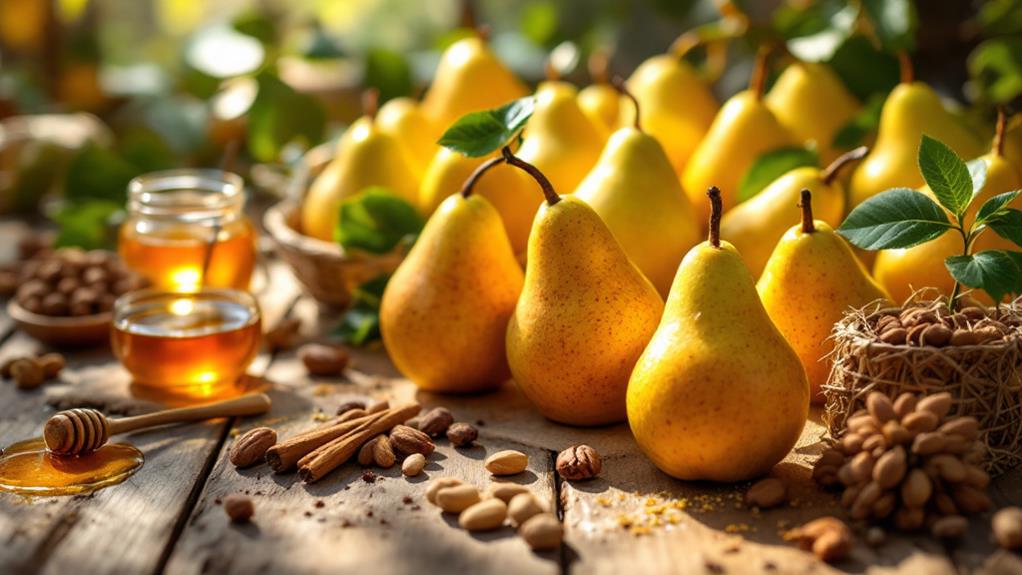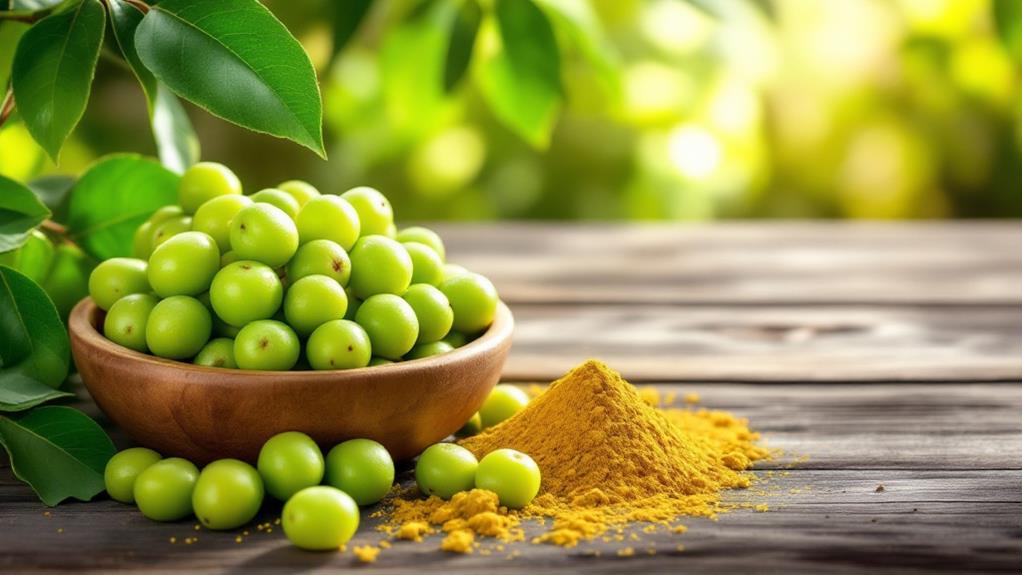What Are Betel Leaves? Health Benefits and Traditional Uses
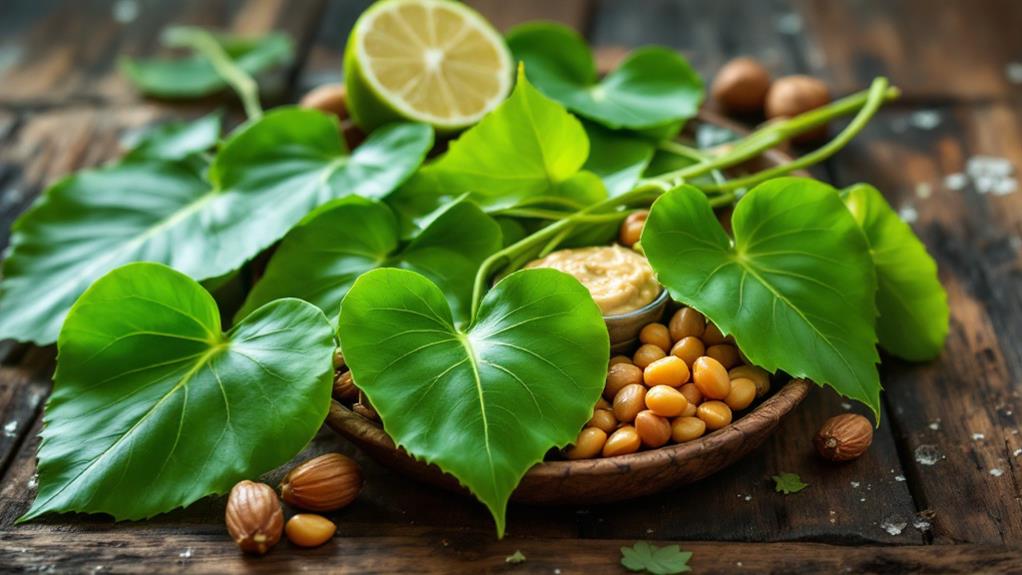
Betel leaves are derived from the Piper betle plant, well-known as a cultural and religious staple in South and Southeast Asia. They're heart-shaped leaves, filled with antioxidants and nutrients like vitamin C, calcium, and iron, making them beneficial for digestion, oral health, and blood sugar regulation. Traditionally, people use them in Ayurvedic medicine for ailments like headaches and respiratory issues. Chewing them is common in cultural rituals, often enhancing mood and acting as a stimulant. While they offer numerous benefits, moderate consumption is key to minimizing risks. Uncover their full potential and diverse applications next.
Understanding Betel Leaves
Betel leaves, known for their glossy green and heart-shaped appearance, are a staple in South Asian cultures due to their medicinal and culinary importance. Derived from the Piper betle plant, these leaves have been cherished since ancient Indian times for their remarkable health benefits. When you investigate the world of betel leaves, you'll uncover their rich content of bioactive compounds, including alkaloids, flavonoids, and tannins, which contribute to their therapeutic properties.
Chewing betel leaves is a traditional practice that's been linked to enhancing oral hygiene. Thanks to their role as an effective antimicrobial agent, betel leaves help maintain a clean and healthy mouth, making them an integral part of oral care routines in many cultures. The antimicrobial properties derived from these bioactive compounds offer protection against a range of pathogens, supporting the leaves' reputation for promoting comprehensive oral health.
Beyond oral hygiene, the therapeutic benefits of betel leaves extend to digestive health and beyond. With their anti-inflammatory and analgesic effects, they've been traditionally used to manage conditions such as diabetes and cancer. By understanding the multifaceted benefits of betel leaves, you can appreciate their enduring significance in traditional and modern wellness practices.
Nutritional Composition
Packed with essential nutrients, betel leaves are a nutritious supplement to any diet. They deliver approximately 49.85 kcal of energy per 100 grams, making them a low-calorie addition perfect for those mindful of their caloric intake. Despite their low-calorie nature, betel leaves boast a balanced nutritional composition. They contain 3.49 grams of protein and 0.73 grams of fat per 100 grams, supporting various bodily functions.
Rich in dietary fiber, betel leaves offer 1.96 grams per 100 grams, contributing to digestive health and helping maintain regularity. In addition to fiber, they're an excellent source of vitamin C, providing 20.66 mg per 100 grams. This vital vitamin plays an essential role in enhancing your immune system and maintaining skin health. For those concerned with mineral intake, betel leaves don't disappoint. They contain crucial minerals like calcium and iron, which are important for bone health and oxygen transport, respectively.
Betel leaves also offer significant levels of beta-carotene (3220 µg per 100 grams), supporting overall health and wellness. Revered since ancient times, these leaves are a powerhouse of nutrients, enhancing the health benefits you gain from your diet.
Health Benefits
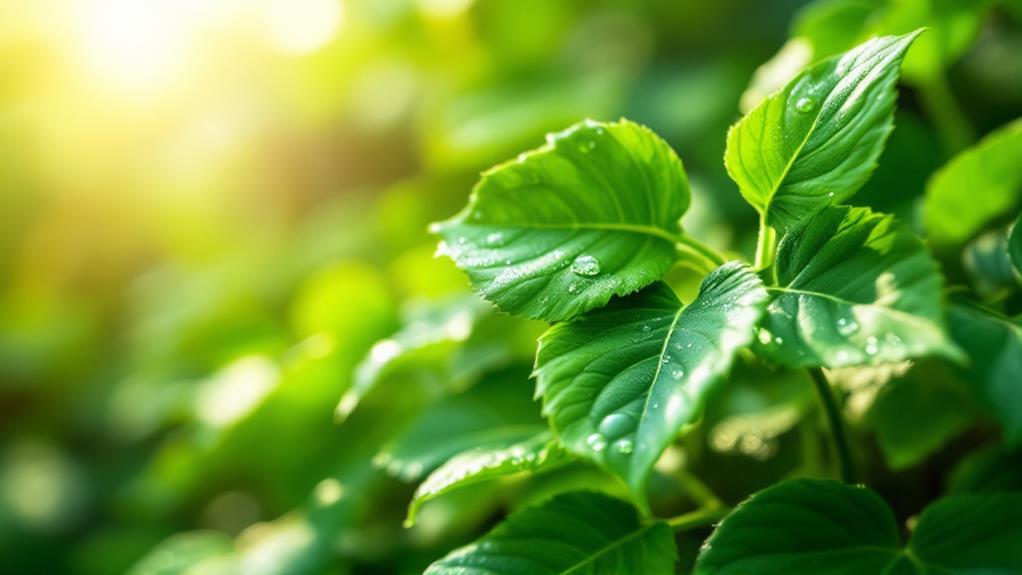
Among the many health benefits that betel leaves offer, their rich antioxidant and essential oil content stands out. These antioxidants can improve digestion and provide effective respiratory support. If you're concerned about oral hygiene, you'll be pleased to know that betel leaves have antimicrobial properties that fight oral pathogens, helping prevent bad breath and infections. This contributes greatly to overall oral health.
For those managing type 2 diabetes, regular consumption of betel leaves can be advantageous. They help regulate blood sugar levels by increasing insulin sensitivity and reducing spikes in blood glucose. This makes them a valuable supplement to a diabetes management plan.
Betel leaves also have notable anti-inflammatory properties. They can alleviate joint pain, menstrual cramps, and general inflammation throughout the body. So, if you're looking for a natural way to ease these discomforts, consider incorporating them into your routine.
Furthermore, the aromatic compounds in betel leaves play a role in improving mental health. They help reduce stress and improve mood by stimulating the release of neurotransmitters. Regardless of whether it's for physical or mental well-being, betel leaves offer a range of health benefits worth exploring.
Traditional Uses
You've investigated the health benefits of betel leaves, and now it's time to uncover their traditional uses. In South Asian cultures, betel leaves have been cherished for centuries, often employed as a traditional remedy. Ancient texts like the Charaka and Sushruta Samhitas, dating back to 400 BC, mention their significance. These leaves are known for their antiseptic properties, making them useful in treating wounds and respiratory issues.
Culinary practices also highlight betel leaves' role as a digestive aid. They're traditionally chewed with areca nut and slaked lime to help with indigestion and freshen breath, a practice that remains popular post-meal. This custom isn't just about health benefits; it symbolizes hospitality and community bonding, as sharing betel leaves is a social ritual in many cultures.
Beyond the culinary and medicinal uses, betel leaves hold spiritual significance. They're commonly placed on altars during religious offerings, with the stem directed towards deities. This practice underscores their revered status in spiritual ceremonies. Regardless of health, culinary, or spiritual purposes, betel leaves continue to play a crucial role in cultural traditions, bridging history with modern practices.
Consumption Methods
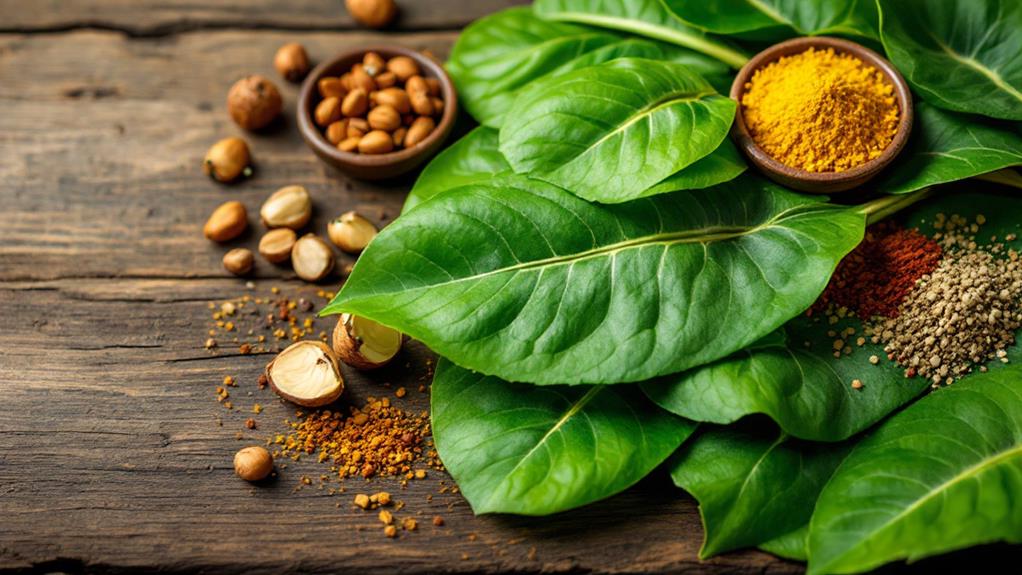
As far as consuming betel leaves, you've got an assortment of methods at your disposal. One popular approach is chewing them directly. This traditional use not only freshens your breath but also aids digestion, especially after meals. If you're not keen on chewing, consider preparing betel leaf juice. This adaptable juice is beneficial for respiratory health and can be used as a skin treatment. Applying it topically can effectively address issues like wounds and infections.
Here are a few ways you might want to try:
- Chewing: Enjoying betel leaves in their natural form improves oral health and digestion.
- Juice: Extracting juice from the leaves supports respiratory function and can be used for multiple skin treatments.
- Infusions: Boiling betel leaves in water creates a soothing infusion that promotes digestion and respiratory health.
Additionally, making a paste from betel leaves offers localized skin treatment. This paste can be applied directly to wounds or infections, providing relief and promoting healing. Topical applications, regardless of whether through juice or paste, make for efficient use of betel leaves in treating skin conditions. With such assorted consumption methods, betel leaves can easily adapt to your personal health needs.
Potential Side Effects
While betel leaves offer numerous health benefits, it's vital to be aware of their potential side effects. Despite their health advantages, overconsumption can lead to several health problems. Chewing betel leaves, especially when mixed with areca nut and slaked lime, can increase the risk of mouth ulcers and oral cancer due to the irritants present in these combinations. To minimize this risk, it's important to avoid combining betel leaves with these substances.
Moreover, high consumption can lead to liver toxicity, particularly if you have pre-existing liver conditions or regularly consume large amounts. The potential for dependence is another concern, as regular use of betel leaves could result in addiction, mirroring the effects seen with tobacco products. Traditional uses may promote regular consumption, but moderation is key.
Additionally, you might experience gastrointestinal discomfort such as nausea and bloating if you overindulge in betel leaves. The best approach is to enjoy betel leaves in moderation and steer clear of harmful mixtures to maintain their health advantages while minimizing the risks. By being mindful of these potential side effects, you can safely incorporate betel leaves into your lifestyle without compromising your health.



